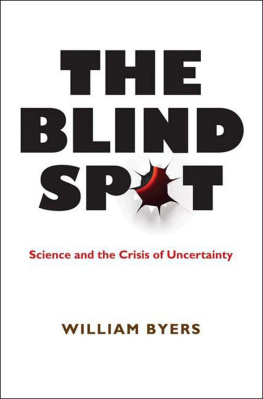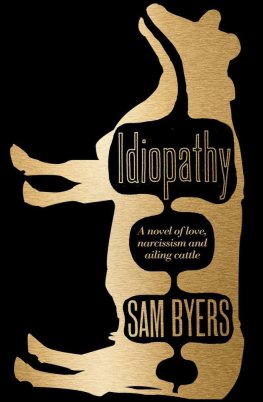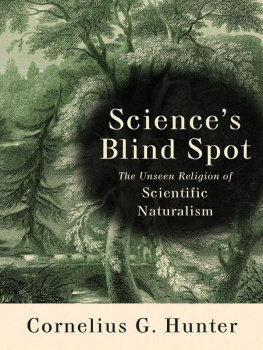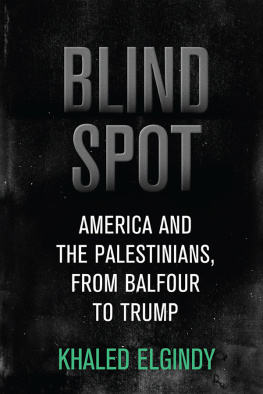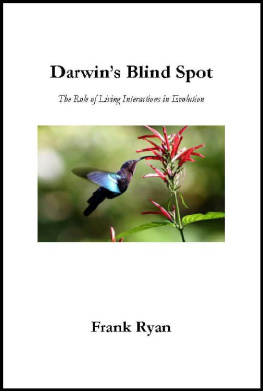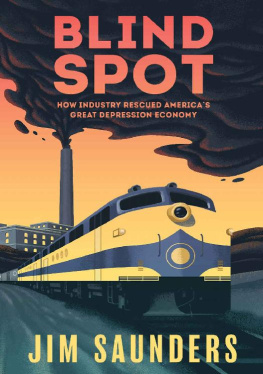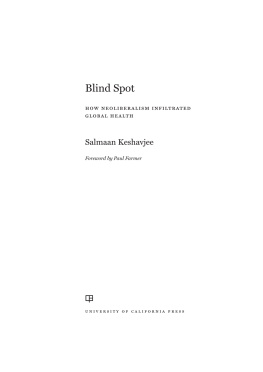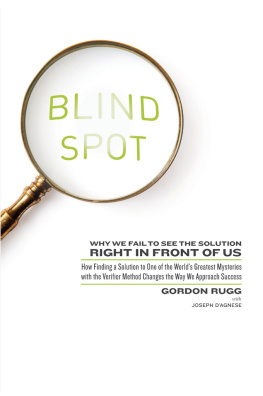William Byers - The Blind Spot: Science and the Crisis of Uncertainty
Here you can read online William Byers - The Blind Spot: Science and the Crisis of Uncertainty full text of the book (entire story) in english for free. Download pdf and epub, get meaning, cover and reviews about this ebook. year: 2011, publisher: Princeton University Press, genre: Religion. Description of the work, (preface) as well as reviews are available. Best literature library LitArk.com created for fans of good reading and offers a wide selection of genres:
Romance novel
Science fiction
Adventure
Detective
Science
History
Home and family
Prose
Art
Politics
Computer
Non-fiction
Religion
Business
Children
Humor
Choose a favorite category and find really read worthwhile books. Enjoy immersion in the world of imagination, feel the emotions of the characters or learn something new for yourself, make an fascinating discovery.
- Book:The Blind Spot: Science and the Crisis of Uncertainty
- Author:
- Publisher:Princeton University Press
- Genre:
- Year:2011
- Rating:5 / 5
- Favourites:Add to favourites
- Your mark:
- 100
- 1
- 2
- 3
- 4
- 5
The Blind Spot: Science and the Crisis of Uncertainty: summary, description and annotation
We offer to read an annotation, description, summary or preface (depends on what the author of the book "The Blind Spot: Science and the Crisis of Uncertainty" wrote himself). If you haven't found the necessary information about the book — write in the comments, we will try to find it.
The Blind Spot: Science and the Crisis of Uncertainty — read online for free the complete book (whole text) full work
Below is the text of the book, divided by pages. System saving the place of the last page read, allows you to conveniently read the book "The Blind Spot: Science and the Crisis of Uncertainty" online for free, without having to search again every time where you left off. Put a bookmark, and you can go to the page where you finished reading at any time.
Font size:
Interval:
Bookmark:
THE BLIND SPOT

Science and the Crisis of Uncertainty

WILLIAM BYERS
PRINCETON UNIVERSITY PRESS
PRINCETON AND OXFORD
Copyright 2011 by Princeton University Press
Requests for permission to reproduce material from this work
should be sent to Permissions, Princeton University Press
Published by Princeton University Press, 41 William Street,
Princeton, New Jersey 08540
In the United Kingdom: Princeton University Press, 6 Oxford Street,
Woodstock, Oxfordshire OX20 1TW
press.princeton.edu
All Rights Reserved
Library of Congress Cataloging-in-Publication Data
Byers, William.
The blind spot : science and the crisis of uncertainty / William Byers.
p. cm.
Includes bibliographical references and index.
ISBN 978-0-691-14684-3 (hardcover : alk. paper)
1. ScienceSocial aspects. 2. Uncertainty (Information theory) I. Title.
Q175.5.B94 2011
500dc22
2010029682
British Library Cataloging-in-Publication Data is available
This book has been composed in Aldus
Printed on acid-free paper.
Printed in the United States of America
1 3 5 7 9 10 8 6 4 2
We are going to have to learn to live with a lot
more uncertainty for a lot longer than our
generation has ever experienced.
Thomas L. Friedman
This book is about science, what it is as opposed to what people say it is; what scientists do as opposed to what most people believe they do. Science is what we use to understand the world and to understand ourselves. It defines what is real and sets limits on what is possible, on what is conceivable. Today when the dream of unending and inevitable progress seems unduly optimistic, then perhaps the time is ripe to go back and reexamine our view of science and sort out its strengths from its weaknesses.
Most people would identify science with certainty. Certainty, they feel, is a state of affairs with no downside, so the most desirable situation would be one of absolute certainty. Scientific results and theories seem to promise such certainty. The popular belief in scientific certainty has two aspects: first, that a state of objective certainty exists and second, that scientific kinds of activities are the methods through which this state can be accessed. Yet I will make the case that absolute certainty is illusory and that the human need for certainty has often been abused with noxious consequences.
Contemporary society is beset by an ever-increasing set of crises and potential crises, which are exacerbated, and in some cases brought on, by a misreading of science and the scientific method, a misreading that we could call pseudo-science. This brings on a kind of vicious circle where the solutions that are proposed to the problems we face only succeed in making matters worse. Is there another, expanded, way of looking at science that will put the drive for certainty in perspective and provide a framework within which uncertainty can be seen as both inevitable and as an opportunity? That is the challenge of this book.
Many people have the nave belief that every problem can be solved by science and technology, through the systematic application of certain practices and ways of thinking. Unfortunately, the leaders of government, commerce, and industry are among those who tend to hold these views. At the other extreme there are those religious fundamentalists who blame many of the ills of civilization on science and fantasize about some pre-scientific paradise. Both of these views elevate science and technology to the center of modern culture. In this respect, at least, both views agree and are correct. Science, both directly and through its influences, is the dominant element in modern civilization.
Yet modern civilization is in crisis! We face not just one crisis but a series of interconnected crisesthe economic crisis, the environmental crisis, and the crisis in relations between the secular and religious worlds, especially the world of religious fundamentalism. There is a deep connection between these crises and the world of science and technology. In fact, a better way to think about the present situation is that what looks like a series of disparate crises is really one crisis that manifests itself in various waysone all-encompassing crisis that arises from inner contradictions that are inherent in modern culture. The origin of this fundamental crisis is to be found in a misunderstanding of the nature of science. Unfortunately, such a misunderstanding is also quite common in those highly educated segments of society that are called upon to respond to the critical situation we face. Ones response to any problem is constrained by ones understanding of it and so it is with our contemporary difficulties.
This book will demonstrate that our understanding of science is simplistic and thus inadequate to the task at hand. We must develop a more sophisticated understanding of what science is, and, as a consequence, what it can and cannot do for us. Most of us assume that science is monolithicscience is science is sciencebut this book will demonstrate that science carries within it diverse tendencies. To highlight these differences I give them different labelsthe science of certainty versus the science of wonder but we should take the former to be a simplistic misinterpretation of the latter. What differentiates these two viewpoints is whether or not what I shall call the Blind Spot is acknowledged. The Blind Spot refers to an intrinsic and inevitable limitation to scientific theories and even to scientific concepts.
All of the crises mentioned here can be traced back, in one way or another, to the point of view of the science of certainty. What Friedman said earlier about the economic situation seems to be generally true of our timesas societies and as individuals, we must learn to live with uncertainty. The two approaches to science that I discuss in this book divide up neatly in this regard; the first attempts to deny or eliminate uncertainty, the second takes uncertainty as an inevitable fact of life, as an opportunity, and considers how best to work with it.
Science and technology have come to define what is real, to define what is true. It is a well-worn clich to say that in order to look for creative solutions to the problems we face, we must learn to think outside the box. A certain ideology of science and technology constitutes the proverbial box in this instance, and we must get outside of it if we hope to deal with the present situation.
I emphasize that I am not condemning science and technology as a whole, nor am I ignorant of the many benefits that science has conferred upon the world. The problem lies not with science but with the point of view that I call the science of certainty, a particular approach to science in which the need for certainty, power, and control are dominant. The identification of all of science with this particular tendency within science makes up a kind of mythology of science. It is this mythology that is called upon when some governments, administrators, and businessmen misuse science to justify their questionable practices. This attitude has caused of a great deal of damage. It must be brought to consciousness if it is to be questioned and changed. It follows that in our search for what has gone wrong and what can be done to fix it, we must take another look at science.
It seems strange to call science a mythology since the story that science tells about itself is precisely that it is objective and empirical; that it concerns itself with the facts and nothing but the facts. This is often what we are referring to when we use the word scientific. And yet science is a human activity, an activity pursued by human beings. This is an obvious statement but it bears repeating since part of the mythology of science is precisely that it is independent of human beings, independent of mind and intelligence. If these claims were correct then they would point to a mystery that is not always appreciated. How do human beings create a system of thought that produces results that are independent of human thought? For science certainly involves a particular way of using the mind. Most often we think of scientific thinking as rational thinking characterized by clarity and logic. Are these the only characteristics of scientific thinking? Are they even the most important ways in which scientists think? Can such thinking conceivably produce the grand creative leaps that science is famous for? Can such thinking help us escape from the box in which we find ourselves?
Next pageFont size:
Interval:
Bookmark:
Similar books «The Blind Spot: Science and the Crisis of Uncertainty»
Look at similar books to The Blind Spot: Science and the Crisis of Uncertainty. We have selected literature similar in name and meaning in the hope of providing readers with more options to find new, interesting, not yet read works.
Discussion, reviews of the book The Blind Spot: Science and the Crisis of Uncertainty and just readers' own opinions. Leave your comments, write what you think about the work, its meaning or the main characters. Specify what exactly you liked and what you didn't like, and why you think so.

